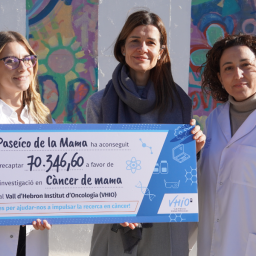
- Final overall survival analysis from the phase 3 INAVO120 study demonstrates that first-line inavolisib in combination with standard-of care palbociclib-fulvestrant significantly improves overall and progression-free survival in endocrine-resistant, PIK3CA-mutated, HR+ HER2- locally advanced or metastatic breast cancer.
- The median overall survival was 34 months in patients assigned to the triplet combination compared with 27 months in patients who received palbociclib/fulvestrant plus placebo.
- The findings, co-authored by Cristina Saura, Head of VHIO’s Breast Cancer Group and the Breast Cancer Unit at the Vall d’Hebron University Hospital, were presented today at the 2025 American Society of Clinical Oncology (ASCO) Annual Meeting and published simultaneously in The New England Journal of Medicine.
- Presented at the same ASCO 2025 oral abstract session, results from a phase 1/1b study support the use of inavolisib in prediabetic or obese patients with HR+ HER2- advanced/metastatic breast cancer harboring PIK3CA mutations.
Results of final overall survival analysis from the international, randomized, double-blind phase 3 INAVO120 trial, presented today at the 2025 ASCO Annual Meeting1 by Nicholas C. Turner of the Royal Marsden Hospital and Institute of Cancer Research in London, UK, show that the addition of inavolisib to palbociclib and fulvestrant as first-line treatment in endocrine-resistant, PIK3CA-mutated, hormone receptor (HR)-positive, human epidermal growth-factor receptor 2 (HER2)-negative, locally advanced or metastatic breast cancer, demonstrated a transformative benefit in overall and progression-free survival. Inavolisib is an oral, PI3Kα-selective inhibitor that also specifically triggers the degradation of the mutant p110α protein.
Published simultaneously in The New England Journal of Medicine2 the findings, co-authored by Cristina Saura, Head of VHIO’s Breast Cancer Group and the Breast Cancer Unit at the Vall d’Hebron University Hospital, could establish this triplet combination as a new treatment option for this patient population.
Among women, breast cancer is the most commonly diagnosed cancer, the leading cause of cancer deaths globally, and it is the second leading cause of global cancer incidence in 2022, with an estimated 2.3 million new cases3. Approximately 70% of breast tumors are classified as the HR+ HER2- subtype. Between 35 and 40% of these cancers harbor mutations in the PIK3CA gene, which are associated with a poor prognosis in advanced breast cancer.
CDK4/6 inhibitors combined with endocrine therapy have become the standard first-line treatment in HR+ HER2- advanced breast cancer, but resistance to current therapies represents an unmet clinical need.
“When breast cancer patients relapse during adjuvant endocrine therapy or within 12 months of completing therapy, it poses a significant clinical challenge,” said Cristina Saura.
INAVO120 was the first phase 3 trial to show a statistically and clinically meaningful progression-free survival benefit with a combination of inavolisib plus palbociclib and fulvestrant in this patient population. These results4 led to the regimen’s approval by the US Food and Drug Administration (FDA) in October 2024.
The study enrolled a total of 325 patients with endocrine-resistant, PIK3CA-mutated HR+ HER2- locally advanced or metastatic breast cancer whose disease progressed during or within 12 months of completing adjuvant endocrine therapy and who had not received prior systemic therapy for locally advanced or metastatic disease.
“Presented today, updated data from final overall survival analysis show that the triplet combination demonstrated a statistically significant and clinically meaningful overall survival benefit compared with placebo plus palbociclib-fulvestrant. Median overall survival was 34 months versus 27 months in the inavolisib and placebo groups, respectively,” observed Saura.
The improvement in progression-free survival was maintained with increased follow-up of patients and a substantial and statistically significant improvement in objective response rate was also observed. The time to chemotherapy was also significantly delayed (by approximately 2 years) in the inavolisib group. The incidence of hyperglycemia, mucositis, diarrhea, and ocular side effects (such as dryness or blurred vision) was higher with inavolisib than with placebo, but all adverse events were manageable with dose adjustments or supportive care.
“INAVO120 is the first study to demonstrate that the simultaneous blockade of the estrogen receptor, cell cycle, and PI3K as first-line treatment in patients whose disease progressed on endocrine therapy delivers a transformative benefit in overall survival and improves disease control. These findings could establish this therapeutic strategy as a new treatment option in Europe for patients with PIK3CA-mutated HR+ HER2- locally advanced or metastatic breast cancer,” concluded Cristina Saura, who also served as member of INAVO120’s Steering Committee.
In Europe, inavolisib is not yet indicated for use outside the context of clinical trials but is currently under evaluation by the European Medicine’s Agency (EMA).
Inavolisib combination in prediabetic or obese patients with HR+ HER2- advanced/metastatic breast cancer harboring PIK3CA mutations
Presented by Mafalda Oliveira, a Senior Medical Oncologist at the Vall d’Hebron University Hospital and Senior Investigator of VHIO’s Breast Cancer Group, data from a phase 1/1b study support the use of the same triplet combination in prediabetic or obese patients with HR+ HER2- advanced or metastatic breast cancer harboring PIK3CA mutations.
“Prediabetes or obesity are prevalent conditions in Western societies and are also two established risk factors for hyperglycemia, which is a common side effect of inavolisib. Findings from this study indicate that, despite being a common side effect in these patients, hyperglycemia was manageable with dose interruptions and oral anti-hyperglycemia medications, and was reversible upon discontinuation of the drug. These results pave the way for further investigation of the use of inavolisib in prediabetic or obese patients,” said Mafalda Oliveira.
###
References
- 2025 ASCO Annual Meeting, May 30 – June 3, Chicago, IL
Corresponding session details:
Oral Abstract Session
Breast Cancer – Metastatic
Date: May 31, 2025
Time: 13:15h CT, 20:15h CEST
Room: Hall B1
Abstract 1003. INAVO120: Phase III trial final overall survival (OS) analysis of first-line inavolisib (INAVO)/placebo (PBO) + palbociclib (PALBO) + fulvestrant (FULV) in patients (pts) with PIK3CA-mutated. Nicholas C. Turner, Seock-Ah Im, Cristina Saura, Dejan Juric, Sibylle Loibl, Kevin Kalinsky, Peter Schmid, Sherene Loi, Eirini Thanopoulou, Noopur Shankar, Yanling Jin, Thomas J. Stout, Tiffany D Clark, Chunyan Song, Komal L. Jhaveri.
Abstract 1004. Phase I/Ib study of inavolisib (INAVO) alone and in combination with endocrine therapy ± palbociclib (PALBO) in patients (pts) with PIK3CA-mutated, hormone receptor–positive, HER2-negative locally advanced/metastatic breast cancer (HR+, HER2– LA/mBC): Analysis of hyperglycemia (HG) in prediabetic/obese pts. Mafalda Oliveira, Melissa K. Accordino, Andres Cervantes, Valentina Gambardella, Erika P. Hamilton, Antoine Italiano, Komal L. Jhaveri, Dejan Juric, Kevin Kalinsky, Ian E. Krop, Cristina Saura, Peter Schmid, Nicholas C. Turner, Andrea Varga, Yanling Jin, Samuel Lim, Stephanie Royer-Joo, Noopur Shankar, Jennifer Schutzman, Philippe Bedard
- Komal L. Jhaveri, M.D., F.A.C.P., Seock-Ah Im, M.D., Ph.D., Cristina Saura, M.D., Ph.D., Dejan Juric, M.D., Sibylle Loibl, M.D., Ph.D., Kevin Kalinsky, M.D., Peter Schmid, M.D., Ph.D, Sherene Loi, M.D., Ph.D., Eirini Thanopoulou, M.D., Ph.D., Noopur Shankar, M.D., Ph.D., Yanling Jin, Ph.D., Thomas J. Stout, Ph.D., Tiffany D. Clark, Ph.D., Chunyan Song, M.D., Nicholas C. Turner, M.D., Ph.D. Overall Survival With Inavolisib in PIK3CA-Mutated Advanced Breast Cancer. NEJM, May 31st, https://www.nejm.org/doi/full/10.1056/NEJMoa2501796.
- Bray F, Laversanne M, Sung H, Ferlay J, Siegel RL, Soerjomataram I, Jemal A. Global cancer statistics 2022: GLOBOCAN estimates of incidence and mortality worldwide for 36 cancers in 185 countries. CA Cancer J Clin. 2024 May-Jun;74(3):229-263.
- Turner NC, Im SA, Saura C, Juric D, Loibl S, Kalinsky K, Schmid P, Loi S, Sunpaweravong P, Musolino A, Li H, Zhang Q, Nowecki Z, Leung R, Thanopoulou E, Shankar N, Lei G, Stout TJ, Hutchinson KE, Schutzman JL, Song C, Jhaveri KL. Inavolisib-Based Therapy in PIK3CA-Mutated Advanced Breast Cancer. N Engl J Med. 2024 Oct 31;391(17):1584-1596.





















